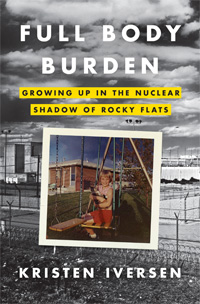Full Critical Response
Kristen Iversen’s memoir picks up praise from critics across the board
August 20, 2012 As the summer goes on, Kristen Iversen’s sobering new memoir, Full Body Burden: Growing Up in the Nuclear Shadow of Rocky Flats, continues to grab the attention of readers. Critics have noticed that the Memphis writer’s style ranges from deeply expressive to factually journalistic in this book, giving it an element of appeal to many different readers.
In Full Body Burden, Iversen describes with exacting detail the trials of growing up near the Rocky Flats nuclear power plant in Colorado, which is now understood to be one of the most dangerous environments created by human intervention. The book follows in parallel fashion both the imminently dangerous saga of the Rocky Flats complex as well as the tragic, self-destructive nature of living under the same roof as an alcoholic father.
Critics from a wide variety of news sources have picked up on Iversen’s intensely personal narrative, as Full Body Burden continues to get the full-press treatment this summer. Salon recently offered up a very positive review of the audiobook version of Iversen’s memoir:

This blending of fact-based reporting with such narrative warmth is no small achievement. The meticulousness of Iversen’s research is so frequently muted by the spell of the storytelling that the listener often forgets for long stretches that the experience is mediated by language at all. John Gardner called this sensation “the uninterrupted dream,” and it’s a thing rarely experienced in the contemporary novel, much less in contemporary works of nonfiction. And in “Full Body Burden,” it has a thematic payoff. Unlike so many writers of history, even polemical history, Iversen never allows her audience to forget that as high as the stakes might be—and in the case of a story about the dangers of nuclear weapons, the stakes couldn’t be any higher.[sic]
And Salon is not by any means the first source to pick up on the appeal of Iversen’s work. See what other critics have had to say about Full Body Burden:
“With meticulous reporting and a clear eye for details, Iversen has crafted a chilling, brilliantly written cautionary tale about the dangers of blind trust.” ~Amy Scribner, writing for BookPage
“It is a hybrid genre that beautifully fuses Iversen’s personal saga of maturation with the profoundly shocking history of the Rocky Flats site that few bothered to inform themselves about even as it actively spewed and dripped a toxic compote of chemicals and elements into Denver’s environment over the course of more than 30 years.” ~Hank Lamport, special to The Denver Post
“Full Body Burden: Growing Up in the Nuclear Shadow of Rocky Flats is memoir—albeit one that captures documented history as well as a family’s private struggles. It’s not really meant to be a book about science. But I think it’s a powerful, well-written memoir that science buffs should read.” ~Maggie Koerth-Baker for BoingBoing
“The book is fascinating from a historical perspective, and disturbing, and tragic.” ~Susan Cohen for Charleston City Paper
“In this shocking and salutary coming-of-age memoir, Kristen Iversen has produced a meticulously researched and compelling narrative of growing up in the ‘sacrifice zone’ of America’s nuclear weapons programme.” ~Melanie McGrath, writing for The Telegraph
Iversen has also been the subject of many interviews for her book, most recently on the Superbug blog for wired.com as well as on Orion Magazine’s website.
You can also listen to a feature on Iversen’s memoir for National Public Radio on their website, or watch a reading and discussion of the book on CSPAN2’s BookTV.
To read Chapter 16’s review of Full Body Burden, click here.